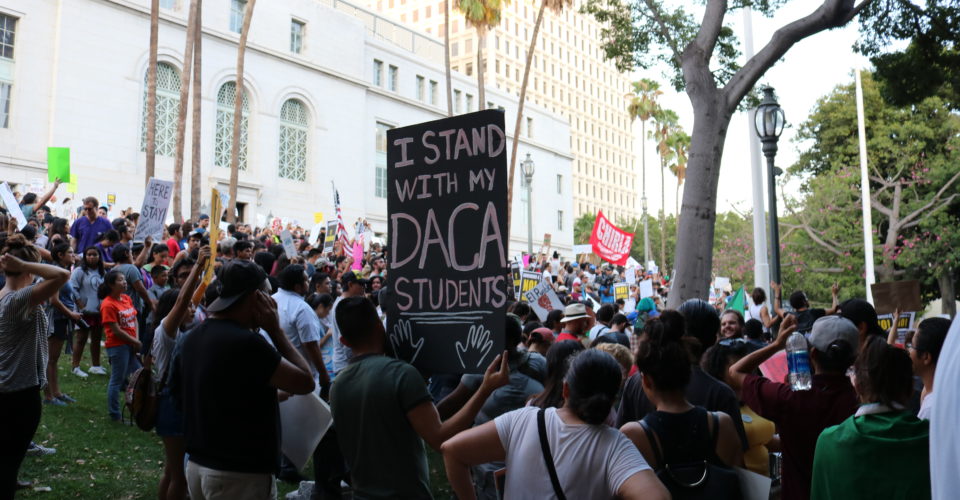“My whole life has been devoted to the United States,” Luis Quiroz said. “I know no other home. California has been my home my whole life.”
By DALIA ESPINOSA
EL NUEVO SOL
Luis Quiroz, a 27-year-old DACA recipient, was on the bus making his way to school when encountering an article’s headline that announced the termination of DACA. He attends San Francisco State University and is nine months away from graduation. This leaves Quiroz with only a couple of months to use his work permit after attaining his degree.
Uncertainty is one word that many people have used to describe the ambience surrounding President Trump’s Sept. 5 decision to rescind the immigration policy that helped nearly 800,000 immigrants reach their dreams of success.
“Personally, I wasn’t prepared for the emotional distress,” said Quiroz in a national press call hosted by the New America Media and Ready California. “I knew it was up in the air. We were all prepared for either outcome, but I don’t think anyone was really emotionally prepared.”
He said the news left him feeling defeated with tears in his eyes. However, Quiroz is no stranger to resilience.
He was brought to the U.S. from Guerrero, Mex. by his family when he was only six months old. They situated themselves in San Diego, Calif., where he grew up until he re-located to San Francisco.
“My whole life has been devoted to the United States,” he said. “I know no other home. California has been my home my whole life.”
Because San Diego stands so close to the Mexican border, deportations became a constant worry for him and his family who lived in the crossfire of excessive ICE activity.
In the past 10 years alone, Quiroz has braved through the chronological deportations of his brother, father, and mother.
Despite his constant struggles and despair to reunite with his family, Quiroz is encouraged to remain in the U.S.
“We’ve had to work twice as hard to get anywhere,” he said, “and now we have to fight twice as hard to keep what is ours. I’m here to stay.”
His parents, like many other migrants, came to America looking for a better future through economic opportunity and an escape of violence.
In a voice-cracking testimony, Quiroz shared the emotional story of his brother’s assassination that took place in Mexico.
The brother, who worked in the tourism business after being deported from the U.S., was shot and killed in front of his 4-year-old daughter back in March.
“Unfortunately, because of my status,” explained Quiroz, “I was not able to make timely arrangements to pay my respects at his funeral. I currently have no way of going to Mexico or seeing his grave or visiting my parents or my brother’s daughter whom I have never met.”
Just last month, qualifying DACA recipients were allowed the opportunity to apply for advance parole, which granted them the freedom to travel outside the U.S.
Quiroz had recently finished gathering the necessary funds and required documentation to apply, but after the Sept. 5 announcement, new applications for advance parole and DACA were no longer accepted.
U.S. Attorney General Jeff Sessions was the appointed person who delivered a 10-minute speech at the White House regarding Trump’s decision to end DACA. Many people criticized Trump’s inability to face Dreamers after pulling the plug on such beneficial program, and many were also left with countless questions.
“There’s so much confusion and fear in the community,” said Allison Davenport, a staff attorney at the Immigrant Legal Resource Center (ILRC). “We really don’t want people to fall prey to fraudulent service providers.”
To clarify any misconceptions, Davenport reassured the public that DACA will “naturally expire over the next two years.” This means that even though the program has ended, it will phase out slowly.
She continued to explain that DACA protection along with its work permit will remain valid until they expire. The revocation of DACA is not immediate and depends on each individual case.
However, the United States Citizenship and Immigration Services (USCIS) will no longer accept new DACA applications, only renewals – that is only if your DACA expires within the next six months between the day of the announcement and March 5, 2018. The deadline for renewals is Oct. 5, and the fee is $495. If an application was submitted before or on Sept. 5, it will continue to be processed.
The revival of DACA or similar legislation will be determined by Congress, but it must act quickly.
Trump has made many empty statements throughout his term and candidacy. Among those assertions, he recently stated that he would revisit the DACA decision if Congress didn’t act within the six month window. Still, skepticism of his words run high.
“What we want to hear, if he wants to really protect these individuals, is that the program will remain in place until some congressional action is taken,” said Ignacia Rodriguez, immigration policy advocate at National Immigration Law Center (NILC), “not giving these arbitrary six month deadlines, creating division between who can apply for renewal and who cannot, saying that those who had never applied for DACA and are eligible cannot apply. If he really wants us not to worry then he would make such a statement.”
In recent news, 15 states and D.C. sued Trump over the termination of DACA. Among those claims, it is said that the Trump administration violated many federal laws.
Rodriguez explained that in order to reverse a long-established policy such as DACA, the government must have a good reason. Nonetheless, Trump’s arguments hit many Americans as insufficient and faulty.
For starters, she reminds the public that many alliances have fought for DACA, authenticating that it is a constructive policy.
The Administrative Procedure Act (APA) is a federal statute that forbids arbitrary and despotic action committed by the federal government, she states. It also prohibits unconstitutional agency decisions and abrupt changes of direction without adequate justification. She continued to argue, “[the government] did not put forth an adequate rationale for reversing the policy, erroneously claiming that it is in conflict with immigration law. The government’s insufficient justification for policy change is in violation of the APA.”
She also argued that the termination of DACA violates “the constitution’s equal protection clause which prohibits the termination on the basis of race, ethnicity, or national origins.”
Lastly, she brought to attention that Trump’s executive decision violates “the due process rights of DACA recipients by failing to safeguard personal information that [they] provided when applying for [the program].”
Rodriguez reminds the public that the fight for DACA goes beyond the courtroom, “we are mobilizing our communities and allies. We are getting our state and local leaders to support and commit to protecting immigrant youth. And we are pushing Congress to act quickly to pass the Dream Act 2017.”
The bill was introduced by senators Lindsey Graham (R-SC), Dick Durbin (D-IL), Jeff Flake (R-AZ), and Chuck Schumer (D-NY) on July 20, 2017.
Rodriguez described the bill as bicameral, bipartisan, and something that would provide a path to citizenship.
Tom Wong, an associate professor of political science at the University of California, San Diego, provided statistics via a survey on DACA recipients.
Similar to Quiroz’s early experience, the average age of entry to the U.S. for DACA recipients is reportedly six and a half years old.
Wong uses this statistic to advocate that Dreamers are “Americans in every sense of the word but for a piece of paper.”
He then revealed that after receiving DACA: 91 percent of them are currently employed, 69 percent moved on to a better paying job, 54 percent moved to a job that fit their academic, training, or long-term career goals, 56 percent moved to a job with better working conditions, and lastly, 5 percent have started their own businesses.
“This is higher than the rate of business starts for the American public as a whole,” he explained. “Which means that DACA is helping to unlock the economic potential of [its] recipients.”
Statistics also show that wages for DACA beneficiaries have increased by 69 percent. Their average annual earnings are estimated to $36,232. As a result, 65 percent of them have purchased their first car, and 16 percent have purchased their first house.
“When it comes to DACA’s impact on the broader economy,” disclosed Wong, “we see that as DACA recipients are earning more income – that translates into higher tax revenues for the federal government as well as for state.”
Sales and property taxes, according to Wong, are one of the many ways in which these Dreamers are contributing to the economy.
A last set of statistics demonstrate that 45 percent of DACA recipients are currently in school and 72 percent are pursuing a bachelor’s degree or higher. Even a 36 percent of Dreamers who are not currently in school have already attained a bachelor’s degree or higher.
“This is not only higher than the native born population as a whole,” said Wong, “but it’s also higher than the natural citizen population, which is the most educated subset of American society.”
It is important to note that most of the statistics mentioned increased once the study focused on DACA recipients who are 25 years or older.
“Given the mounting, empirical evidence suggesting DACA works,” said Wong, “the administration’s decision to end DACA doesn’t reflect good policy or in my view political expediency.”
For a more in-depth view of Wong’s study, click here. For more information on finding local service providers, visit this site.
Tags: Allison Davenport DACA Dalia Espinosa Ignancia Rodriguez Legal Resource Center Luis Quiroz National Immigration Law Center New America Media Tom Wong University of California San Diego





















